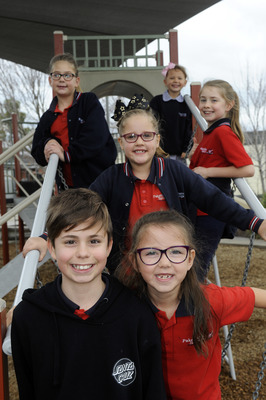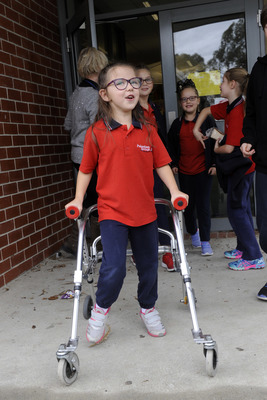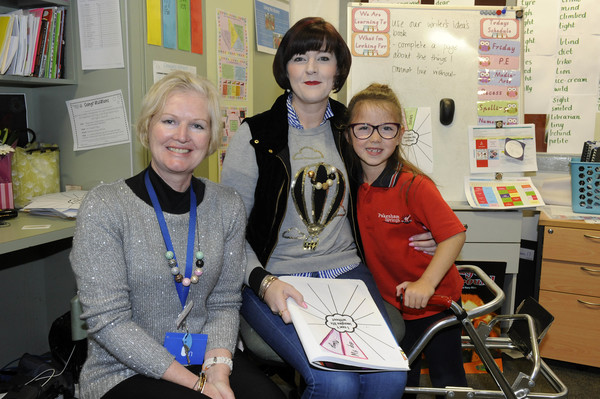By Kyra Gillespie
More and more families are slipping through the cracks when it comes to government disability funding.
Eight-year-old Tayla Greene of Pakenham was diagnosed with cerebral palsy at just 18 months of age.
While she is passionate for singing and gymnastics, being bound to a walker has been tough for the active little girl.
Each day Tayla’s mum Lisa has to help her get out of the bed in the morning, help her go to the toilet, help her shower, help her to the breakfast table, help her put on her shoes, help her in the car for school, and help her out of the car.
Even a simple trip to the kitchen tap for a glass of water is hard work.
When Tayla isn’t at school she is undertaking intense physiotherapy sessions, massages and other treatments in an effort to ease her aching muscles.
Yet Tayla’s disability doesn’t currently qualify under the National Disability Insurance Scheme (NDIS), which means the young family do not receive any financial support.
As a result Brent and Lisa Greene have had no choice but to reach into their own pockets to pay for Tayla’s medical expenses.
In 2016 alone the expenses reached $20,000, all of which they were able to cover through fundraisers.
“As soon as Tayla turned seven that was it, we’ve been on our own and everything has been out of our pocket,” Lisa said.
“If you don’t qualify you don’t get funding – that’s it.
“We had to hire a wheelchair for a whole year because we couldn’t even get that.
“We find it hard enough, but what about parents who have multiple children with disabilities? How do they get by?”
Tayla is Lisa and Brent’s first child, born nine weeks premature.
Lisa described feeling “numb” when they were told their baby daughter had cerebral palsy.
“It was really hard at first; I spent countless hours researching all the treatments available out there.
“We were instructed to just send Tayla to conventional physiotherapy sessions to help her muscles, but it wasn’t working, she was still in so much pain. So we tried alternative therapy and that was a game changer.
“For the first 18 months she had no movement, and after one session with Feldenkrais method she was rolling. After five sessions she was crawling.”
The family has also tried Rolfing, a Therasuit, and Vibration Therapy.
Tayla has also had sessions with Chad Timmermans, who specialises in paediatric rehabilitation.
But he doesn’t come cheap, costing $7000 for a three-week intensive therapy course. “We do intensive strength, balance and movement training through increased neurological control over the body,” Mr Timmermans said.
“Three weeks of intensive therapy can achieve the same as nine months of conventional therapy.”
Mr Timmermans said it was “insane” that Tayla does not qualify under the NDIS.
“If there was funding out there for her she would be running now instead of walking,” he said.
“She should qualify because she relies on a walker and can’t move around independently.
“The government don’t provide enough funding to actually make a change. They will fund a wheelchair or walker to help kids walk, but nothing that will actually teach them how to get better at walking.” Lisa said. “There is a stigma attached to seeking non-conventional treatment methods.
“For a long time we kept quiet about the treatments because people thought we were crazy and didn’t think it would work.“We do it because it works – nothing else has benefited Tayla more.”
Tayla’s biggest fan besides her parents is her little sister Lexi, who is five years old.
“Lexi does everything for Tayla; whether it’s getting her a drink or fetching something from her room she’s always keeping an eye out for her big sister.
“One time Tayla did cross country and didn’t get a medal, so Brent brought out one of his medals and gave it to her and Lexi started to cry.
“When I asked her what was wrong she told me she was ‘crying with happiness.’
“Lexi is energetic and out there, but she’s a different kid when it comes to Tay.”
While it’s been a long journey so far, Lisa said she wanted to share her experiences in order to help other parents.
“I want other parents to see that there is other help out there, you just have to think outside of the box,” she said.
“While it has come at a cost, it has meant that Tayla is set up for life in a way she wouldn’t have been if we’d just followed standard advice and put her in a wheelchair from the get-go.
“Our own experiences with the disability system have opened our eyes to the gaps that exist.
“We just have to take each day as it comes and keep helping Tayla in the best way that we can.”










